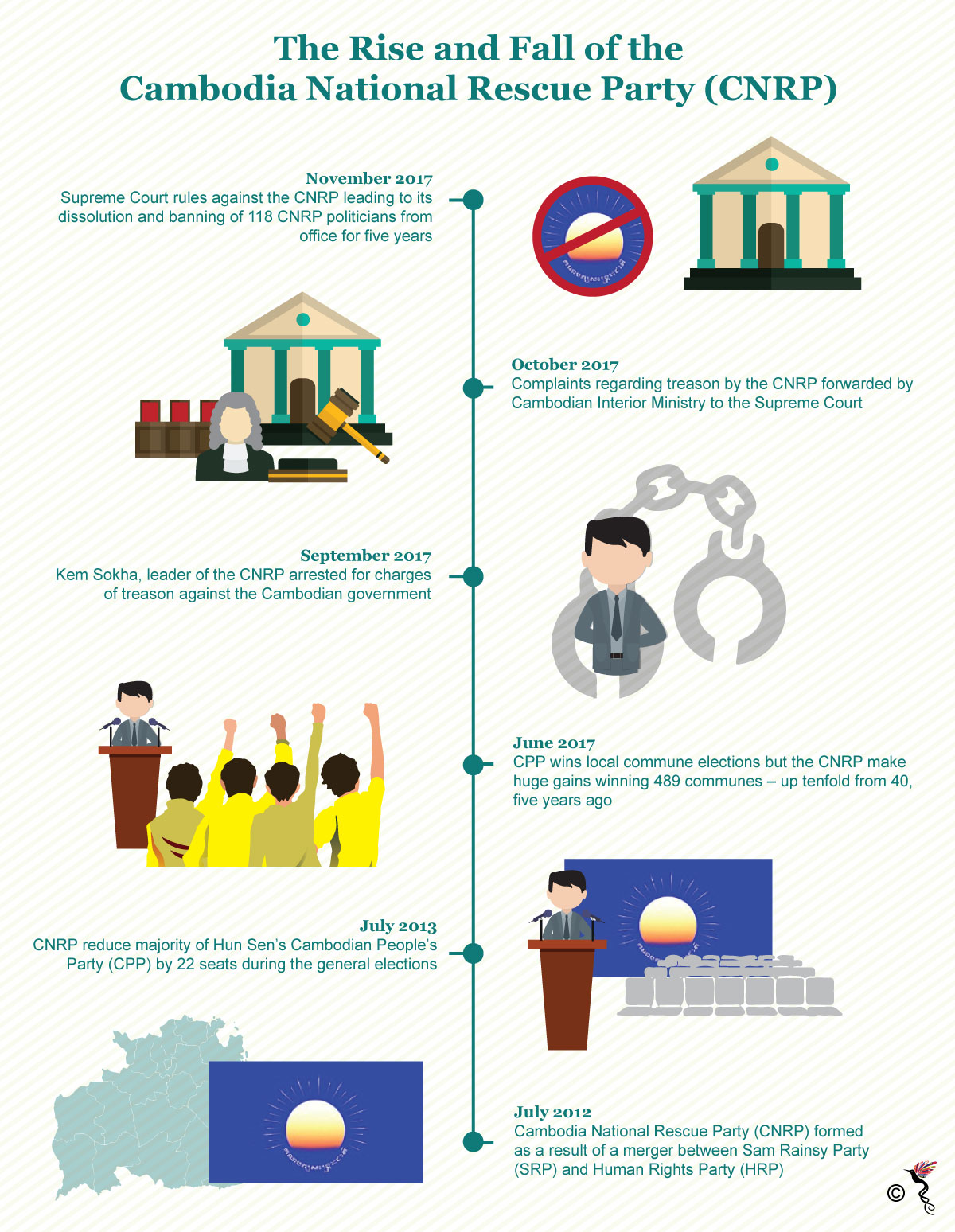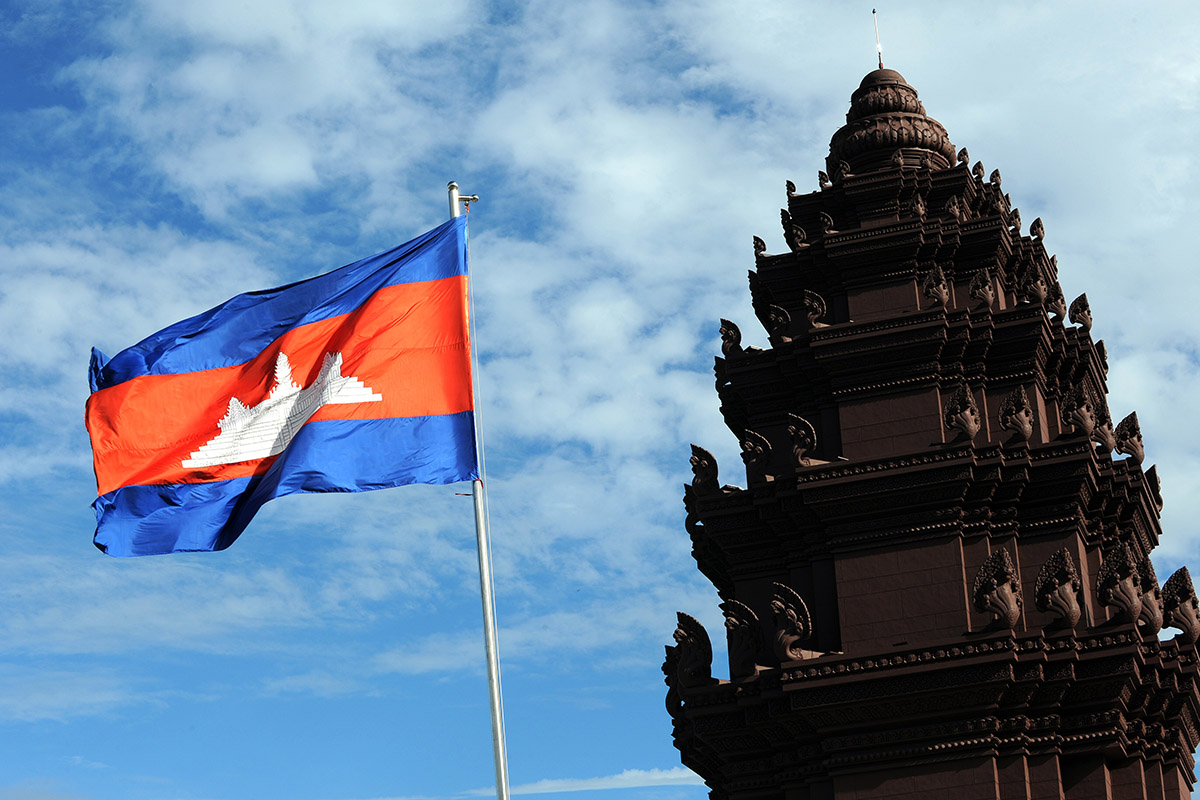Cambodia’s democracy woes are far from over.
On Thursday, the country’s Supreme court dissolved the main opposition party, the Cambodian National Rescue Party (CNRP) and banned 118 its politicians from office for five years. The CNRP which boycotted the trial, described the action as “politically motivated and made under pressure to follow the wish of the ruling party that is trying to rid CNRP from the political field.”
In September, the leader of the CNRP, Kem Sokha was arrested on charges of treason against the Cambodian government. He was accused of conspiring with Washington to bring down the Cambodian government led by Hun Sen.
The judge presiding over the case, Dith Munty, himself a close associate of Hun Sen and a high-ranking member of the ruling Cambodian People’s Party said that because the CNRP boycotted the trial, it constituted to a confession that they had indeed been conspiring with the United States to revolt against the Cambodian government.
Death knell to democracy
CNRP’s dissolution invited criticism from governments and international human rights organisations alike.
The White House in a statement called for the Cambodian government to “undo its recent actions against the CNRP, release imprisoned CNRP leader Kem Sokha, and allow opposition parties, civil society and the media to maintain their legitimate activities.”
Echoing that sentiment, the Swedish government urged “Cambodia to allow the political opposition, the media and civil society organisations to operate freely,” adding that in light of the court’s actions, Sweden will be reviewing its engagements with Cambodia.
The ASEAN Parliamentarians for Human Rights (APHR) blasted the decision as “the final nail in the coffin for Cambodian democracy.”
“Dissolving the opposition means dissolving democracy. It renders elections irrelevant and further pushes Cambodia down a slippery slope,” said APHR Chairperson, Charles Santiago.
Human Rights Watch (HRW) also slammed the outcome and its Asia Director, Brad Adams lamented that Hun Sen’s naked power grab meant that Cambodian democracy will continue to freefall for as long as he is in power.
“This is a watershed moment, requiring a strong and concerted international response. It’s time for action, not words,” he said.
Many international observers have also joined HRW in calling on donors like European nations and Japan to stop providing financial and technical assistance for Cambodia’s upcoming elections slated for next year.
Hun Sen’s dominance continues
The previous general elections in 2013 saw the CNRP reduce the majority held by the CPP by 22 seats, prompting its spokesperson to declare that the CNRP will rule Cambodia after the 2018 general elections. Since then, support for the opposition increased dramatically especially amongst young urban voters who seek a change from the 32-year regime of Hun Sen’s CPP. Moreover, local elections held in June this year dealt a huge blow to the CPP as it lost hundreds of commune seats to the CNRP.

Rise and fall of the CNRP
Hun Sen will not take opposition to his rule lightly, thus he started to dismantle the opposition – first by removing the opposition leader, Kem Sokha. Sokha was arrested in September in a commando-styled swoop and is yet to be granted bail. While he languishes in prison, Hun Sen targeted other opposition members who began fleeing the country in fear of incarceration. Herein lies the problem with the personalist political parties like the CNRP – once the leader is removed, the party falls into disarray.
Sokha’s daughter, Monovitya Kem tweeted on the day of the ruling that “CNRP has ceased to function as political party since arrest of Kem Sokha. Whatever is today’s ruling is meaningless. Focus needs to be on overall conditions for free, fair elections.”
However, free and fair elections remain a far-fetched dream for Cambodia as Hun Sen likely to win with minimal opposition in general elections next year. Despite there being other minor opposition parties in Cambodia, they are all largely held as puppets of Hun Sen’s regime.
According to Associate Professor of Diplomacy & World Affairs at Occidental College of Los Angeles, Sophal Ear, the opposition hardly has enough time to regroup and effectively challenge Hun Sen’s CPP.
“The movement for change remains, it will simply have to take a different path,” he said in an email interview with The ASEAN Post.
Nevertheless, Ear reminded that change is not impossible, citing embattled Zimbabwean President, Robert Mugabe, who has been in power for 37 years but has recently been sacked from his party and is now facing impeachment.
“As the proverb goes: you meet your fate on the road you use to avoid it. This may well apply to what the ruling party has done to avoid its fate, but change is inevitable. Look at Mugabe – 37 years and poof. Gone. Just like that.”
Recommended stories:
